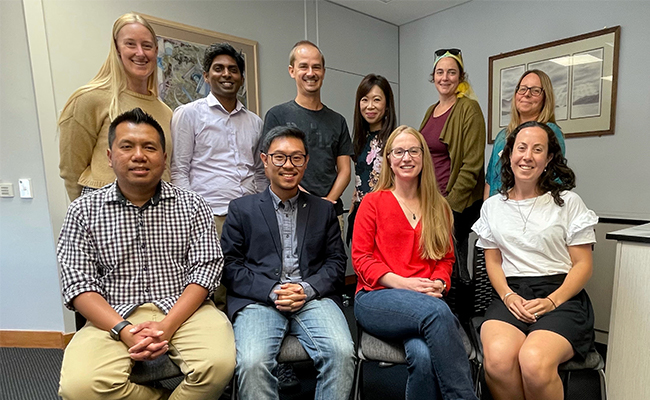
The Early to Mid-Career Research Group management committee.
A group of early to mid-career researchers within the Division of Health Sciences is helping to support their peers to achieve research excellence.
The Health Sciences Early and Mid-Career Researcher Group was established last year by the Division for early and mid-career researchers to support their peers to achieve research excellence at Otago. The group aims to advocate and create opportunities for career development of junior researchers.
The inaugural Health Sciences Early to Mid-Career Researchers Symposium was held on 23 February, themed: “Facilitating Research Excellence, Impact and Sustainability: A Focus on Early and Mid-Career Researchers”.
“The real outcomes that we are seeking here is that we want more successes of course, more successes and career development keep us in jobs and keep the research going. We want to enhance research excellence, but also really focus on research sustainability.”
Division of Health Sciences Pro-Vice-Chancellor Professor Paul Brunton says it is important the University helps to facilitate funding and development opportunities for junior researchers, who at the end of the day are the future of academic endeavours for the university and elsewhere.
He acknowledged 2020 was a difficult year for everyone but particularly for early to mid-career researchers and pledged to work on initiatives and strategies to further support them.
Representatives from the Early & Mid-Career Researchers Management Committee from Dunedin, Christchurch and Wellington attended the symposium both in-person and virtually.
Early & Mid-Career Researchers Management Committee Chair Dr Khoon Lim says the group hopes to launch activator grants through the Division this year. This would involve small pots of funding to help early career researchers conduct preliminary experiments or get access to specialised equipment which would hopefully enhance their chances in gaining future funding, he says.
The Committee is also looking into providing mentoring and professional development programmes throughout the year.
“The real outcomes that we are seeking here is that we want more successes of course, more successes and career development keep us in jobs and keep the research going. We want to enhance research excellence, but also really focus on research sustainability.
“We want to retain the really good talent in the Division and start looking at establishing the new and emerging leaders in the field.”
Recently appointed Associate Dean Research for the Division of Health Sciences Professor Roslyn Kemp sees her role as trying to unify the research within the Division to increase its impact and get more early and mid-career researchers and their ideas funded.
“What we are trying to do as a Division is to say we can support you in any career you choose. Also, we'd like to give you some more real-life examples of opportunities there are in research, and to give you some freedom and some excitement so you can still keep your passion, still keep your research focus and a career but feel happy about it.”
The symposium also featured Director of Research & Enterprise Dr Martin Gagnon who spoke about the role of Research & Enterprise in supporting research excellence.
Research Fellow Maria Larcombe discussed the impact of research, while Senior Lecturer Anna Tiatia Fa'atoese Latu discussed the significance of Māori Health Advancement.